-
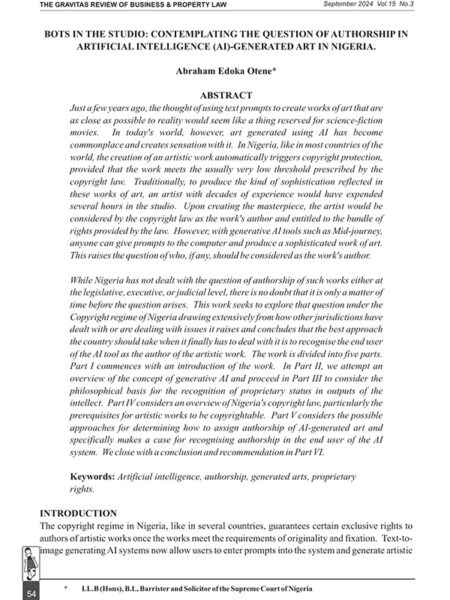
Bots in the Studio: Contemplating the Question of Authorship in Artificial Intelligence (AI)-Generated Art in Nigeria
0₦2,500.00Abraham Edoka Otene in his article, Bots in the Studio: Contemplating the Question of Authorship in Artificial Intelligence (AI)-Generated Art in Nigeria, explores the authorship of AI generated works under the Copyright regime of Nigeria drawing extensively from how other jurisdictions have dealt with or are dealing with issues it raises and concludes that the best approach the country should take when it finally has to deal with it is to recognize the end user of the AI tool as the author of the artistic work. Just a few years ago, the thought of using text prompts to create works of art that are as close as possible to reality would seem like a thing reserved for science-fiction movies. In today’s world, however, art generated using AI has not only become commonplace but is also creating sensation with it. While Nigeria has not dealt with the question of authorship of such works either at the legislative, executive, or judicial level, there is no doubt that it is only a matter of time before the question arises.
-
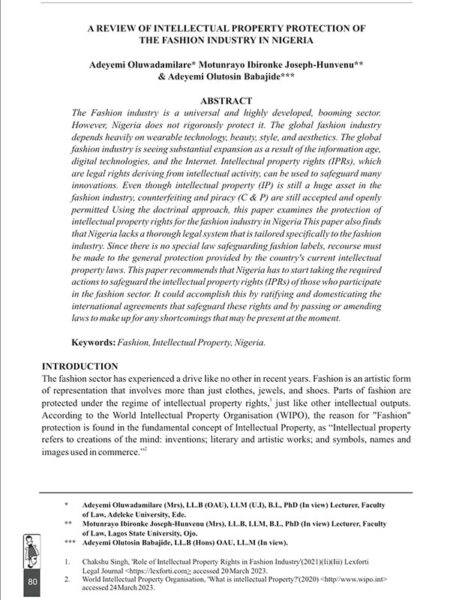
A Review of Intellectual Property Protection of the Fashion Industry in Nigeria
0₦2,500.00Adeyemi Oluwadamilare, Motunrayo Joseph-Hunvenu and Adeyemi Babajide, in their article, A Review of Intellectual Property Protection of the Fashion Industry in Nigeria, explore the legal regime for the protection of intellectual rights in the fashion industry in Nigeria. The fashion industry is a universal and highly developed, booming sector. However, Nigeria does not rigorously protect it. The global fashion industry depends heavily on wearable technology, beauty, style, and aesthetics. The industry is seeing substantial expansion as a result of the information age, digital technologies, and Internet. Intellectual property rights (IPRs), which are legal rights deriving from intellectual activity, can be used to safeguard many innovations. Despite the fact that intellectual property (IP) is still a huge asset in the fashion industry, counterfeiting and piracy are accepted and openly permitted. Using the doctrinal approach, this paper examines the protection of IPRs for the fashion industry in Nigeria The paper finds that Nigeria lacks a thorough legal system that is tailored specifically to the fashion industry. Since there is no special law safeguarding fashion labels, recourse must be made to the general protection provided by the country’s current intellectual property laws. The paper recommends that Nigeria has to start taking the required actions to safeguard the IPRs of those who participate in the fashion sector. It could accomplish this by ratifying and domesticating the international agreements that safeguard these rights and by passing or amending laws to make up for any shortcomings that may be present at the moment.
-
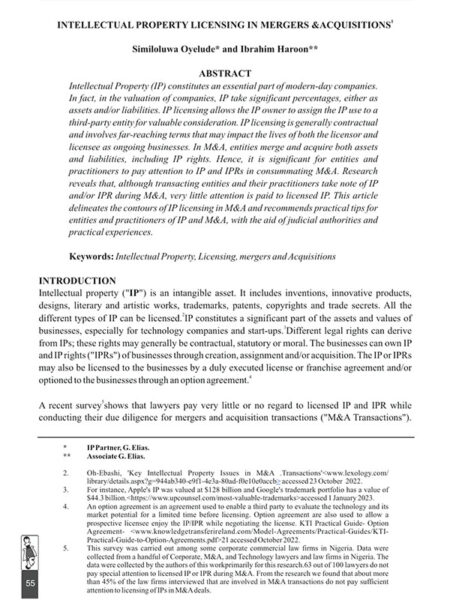
Intellectual Property Licensing in Mergers and Acquisitions
0₦2,500.00Similoluwa Oyelude and Haroon Ibrahim in his article, Intellectual Property Licensing in Mergers and Acquisitions, delineate the contours of IP licensing in M&A and recommends practical tips that are helpful for entities and practitioners of IP and M&A, with the aid of judicial authorities and practical experiences
-
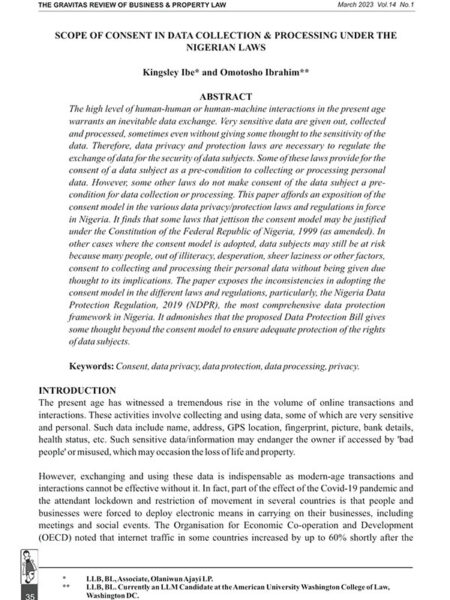
Scope of Consent in Data Collection and Processing under the Nigerian Laws
0₦2,500.00Kingsley Ibe and Omotosho Ibrahim, in their article Scope of Consent in Data Collection and Processing under the Nigerian Laws provide an exposition to the consent model in the various data privacy/protection laws and regulation in force in Nigeria. Some of the laws which jettison the consent model may be justified under the Constitution of the Federal Republic of Nigeria, 1999 (as amended). In other cases were the consent model is adopted, data subjects may still be at risk because many people, out of illiteracy, desperation, sheer laziness or other factors, consent to the collection and processing of their personal data without given due thought to its implications. Ibe and Ibrahim expose the inconsistencies in the adoption of the consent model in the different laws and regulations, particularly, the Nigeria Data Protection Regulation, 2019 (NDPR) which is the most comprehensive data protection framework in Nigeria. Ibe and Ibrahim admonish that the proposed Data Protection Bill give some thought beyond the consent model to ensure adequate protection of the rights of data subjects.
-
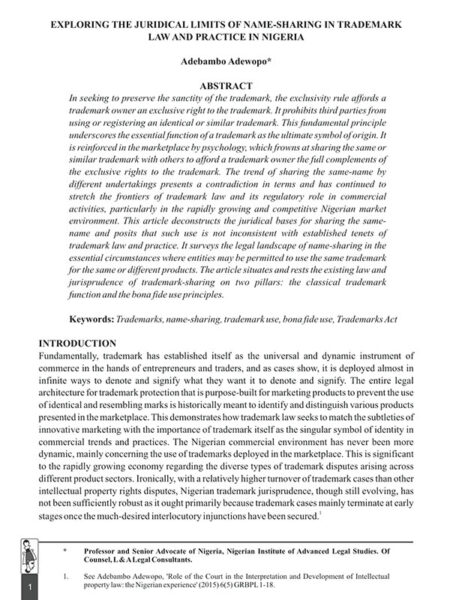
Exploring the Juridical Limits of Name Sharing in Trade Mark Law & Practice
0₦2,500.00Professor Adebambo Adewopo,in his article, Exploring the Juridical Limits of Name Sharing in Trade Mark Law & Practice explores the trend of sharing the same name by different undertakings in the rapidly growing and competitive Nigerian market environment. Prof Adewopo deconstructs the juridical bases for sharing the same name and posits that such use is not inconsistent with established tenets of trademark law and practice. Adewopo surveys the legal landscape of name-sharing in the key circumstances where entities may be permitted to use the same trademark in respect of the same or different products. The article situates and rests the existing law and jurisprudence of trademark-sharing on two pillars, namely the classical trademark function and the bona fide use principles.
-
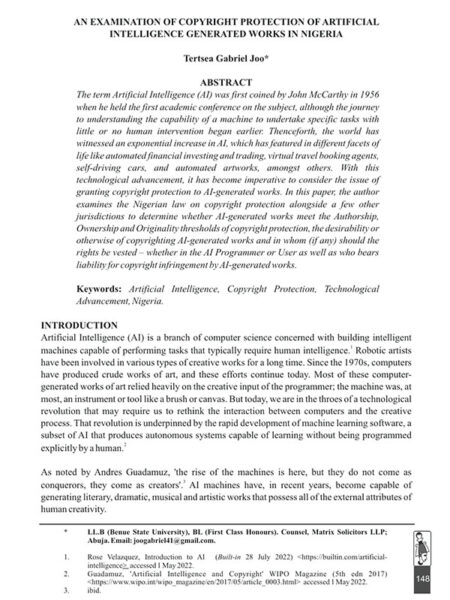
An Examination of Copyright Protection of Artificial Intelligence Generated Works in Nigeria
0₦2,500.00Tertsea Joo of Matrix Solicitors in his paper, An Examination of Copyright Protection of Artificial Intelligence Generated Works in Nigeria, notes that the world has witnessed an exponential increase in Artificial Intelligence (AI) which has featured in different facets of life like automated financial investing and trading, virtual travel booking agents, self-driving cars, and automated artworks, amongst others. With this technological advancement, it has become imperative to consider the issue of granting copyright protection to AI-generated works. Tertsea examines the Nigerian law on copyright protection alongside a few other jurisdictions to determine whether AI-generated works meet the Authorship, Ownership and Originality thresholds of copyright protection, the desirability or otherwise of copyrighting AI-generated works and in whom the rights should be vested – whether in the AI Programmer or User as well as who bears liability for copyright infringement by AI-generated works.
-
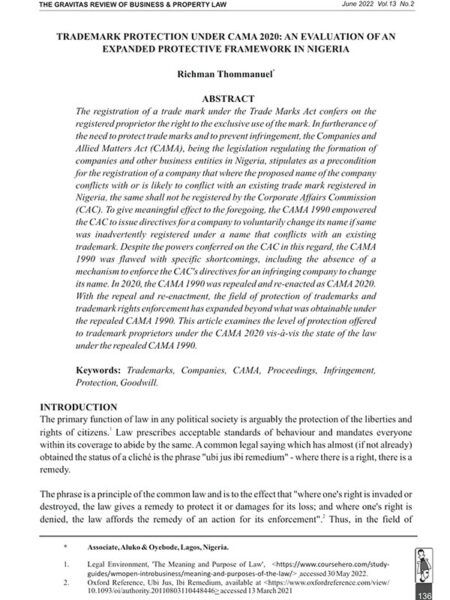
Trademark Protection Under the Companies and Allied Matters Act 2020: An Evaluation of an Expanded Protective Framework in Nigeria
0₦2,500.00Richman Thommanuel, Associate, Aluko & Oyebode, in his article, Trademark Protection Under the Companies and Allied Matters Act 20202: An Evaluation of an Expanded Protective Framework in Nigeria, explains that in furtherance of the need to protect trademarks and prevent infringement, the Companies and Allied Matters Act (CAMA) stipulates as a precondition for the registration of a company, that where the proposed name of the company conflicts with or is likely to conflict with an existing trade mark registered in Nigeria, the name shall not be registered by the Corporate Affairs Commission (CAC). To give meaning to the provision, the CAMA 1990 empowered the CAC to issue directives for a company to voluntarily change its name if the same was inadvertently registered under a name that conflicts with an existing trademark. Despite the powers conferred on the CAC in this regard, the CAMA 1990 was flawed with shortcomings, including the absence of a mechanism to enforce the CAC’s directives for an infringing company to change its name. This lacuna has been addressed by CAMA 2020. Richman examines the expanded protective framework under the re-enacted CAMA.
-
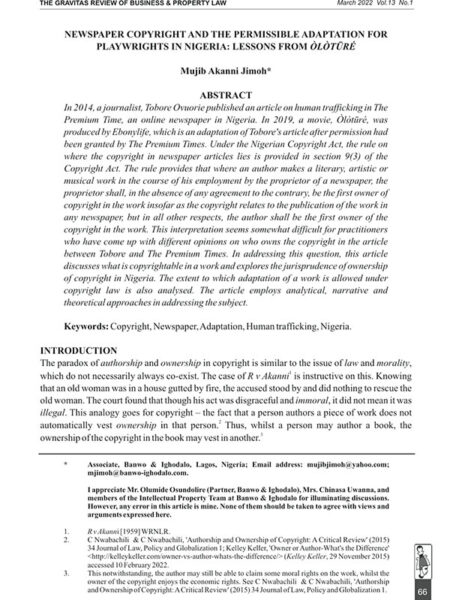
Newspaper Copyright and the Permissible Adaption for Playwrights in Nigeria: Lessons from Òlòtūré
0₦2,500.00Mujib Jimoh, Associate, Banwo & Ighodalo, Lagos, Nigeria, in his article, Newspaper Copyright and the Permissible Adaption for Playwrights in Nigeria: Lessons from Òlòtūré, explains that in 2014, a journalist, Tobore Ovuorie published an article on human trafficking in The Premium Times, an online newspaper in Nigeria. In 2019, a movie, Òlòtūré, which became a Netflix blockbuster, was produced by Ebonylife, which is an adaptation of Tobore’s article after permission had been granted by The Premium Times. Tobore posited that she ought to grant the permission. Under the Nigerian Copyright Act, the rule on where the copyright in newspaper articles lies is provided in section 9(3). There were differing interpretations of section 9(3) by practitioners. In this brilliant article, Mujib dissects the differing claims and interpretations. He discusses what is copyrightable in a work, the jurisprudence of ownership of copyright in Nigeria, and the extent to which adaptation of a work is allowed under copyright law.
-
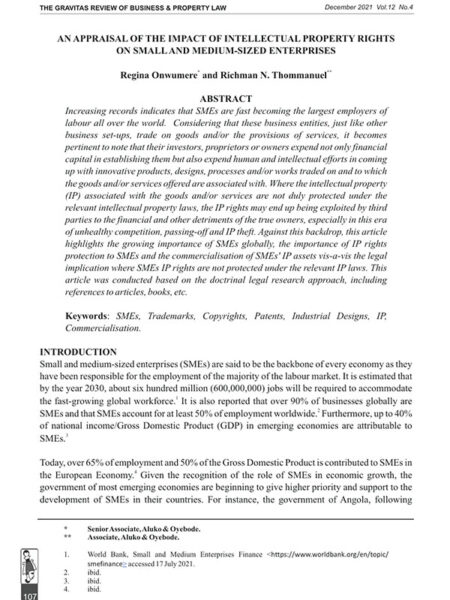
An Appraisal of the Impact of Intellectual Property Rights on Small and Medium-Sized Enterprises
0₦2,500.00Regina Onwumere and Richman Thommanuel, both of Aluko & Oyebode, in their article, An Appraisal of the Impact of Intellectual Property Rights on Small and Medium-Sized Enterprises, indicate that small and medium-sized enterprises (SMEs) are fast becoming the largest employers of labour all over the world. Where the intellectual property (IP) associated with the goods or services produced by SMEs are not duly protected under the relevant intellectual property laws, the IP rights may end up being exploited by third parties to the detriment of the true owners. Against this backdrop, the authors highlight the growing importance of SMEs globally, the importance of IP rights protection to SMEs and the commercialisation of SMEs’ IP assets vis-a-vis the legal implication where SMEs IP rights are not protected under the relevant IP laws.
-
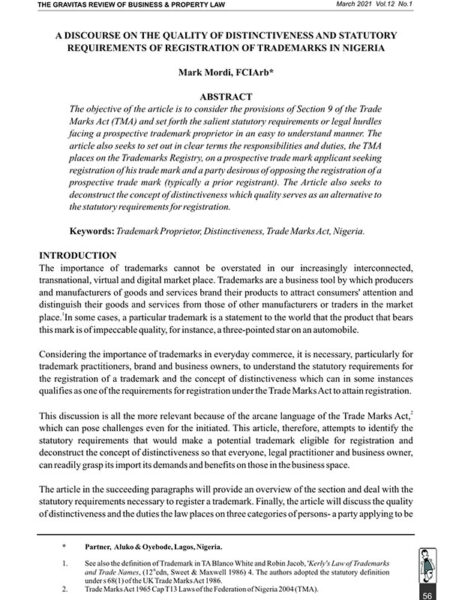
A Discourse on the Quality of Distinctiveness and Statutory Requirements of Registration of Trademarks in Nigeria
0₦2,500.00Mark Mordi, Partner Aluko & Oyebode in, A Discourse on the Quality of Distinctiveness and Statutory Requirements of Registration of Trademarks in Nigeria, deconstructs the concept of distinctiveness which quality, serves as an alternative to the statutory requirements for registration. Mordi examines the responsibilities and duties the Trade Marks Act 1965 places on the Trademarks Registry, on a prospective trademark applicant seeking registration of his trademark, and a party desirous of opposing a trademark registration (typically a prior registrant).
-
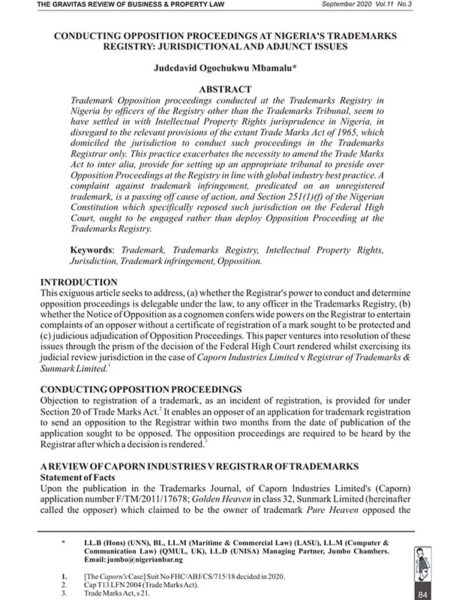
Conducting Opposition Proceedings at Nigeria’s Trademark Registry: Jurisdictional and Adjunct Issues
0₦2,500.00Dr Judedavid Mbamalu, Managing Partner Jumbo Chambers, in his article, Conducting Opposition Proceedings at Nigeria’s Trademark Registry: Jurisdictional and Adjunct Issues, posits that Trademark Opposition proceedings conducted at the Trademarks Registry in Nigeria by officers of the Registry other than the Registrar, seem to be the norm in disregard of the relevant provisions of the Trade Marks Act 1965 which reposes the jurisdiction to conduct such proceedings in the Trademarks Registrar only. Dr Mbamalu reviews the decision of the Federal High Court in Caporn Industries Limited V. Registrar of Trademarks and concludes that a complaint against trademark infringement, predicated on an unregistered trademark, ought to be ventilated at the Federal High Court rather than using Opposition proceedings at the Trademarks Registry as a short cut to pursue such claims.
-
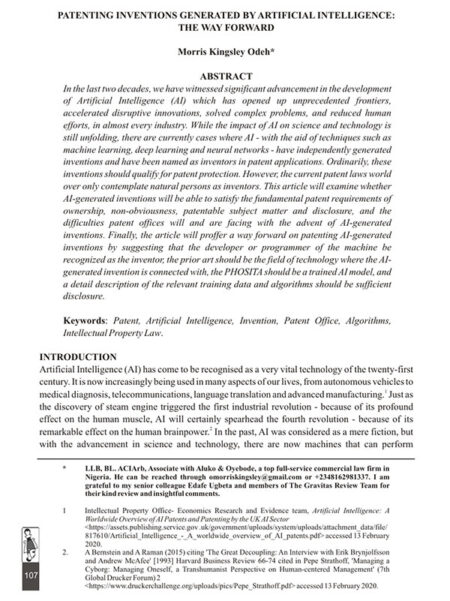
Patenting Inventions Generated by Artificial Intelligence: The Way Forward
0₦2,500.00Morris Odeh, Associate with Aluko & Oyebode in his article, Patenting Inventions Generated by Artificial Intelligence: The Way Forward, observes that the world has witnessed significant advancement in the development of Artificial Intelligence (AI) which has opened up unprecedented frontiers, accelerated disruptive innovations, solved complex problems, and reduced human efforts, in almost every industry. While the impact of AI on science and technology is still unfolding, there are currently cases where AI – with the aid of techniques such as machine learning, deep learning and neural networks-have independently generated inventions and have been named as inventors in patent applications. Ordinarily, these inventions should qualify for patent protection. However, the current patent laws only contemplate natural persons as inventors. Odeh examines whether AI-generated inventions will be able to satisfy the fundamental patent requirements of ownership, non-obviousness, patentable subject matter and disclosure, and the difficulties patent offices will and are facing with the advent of AI-generated inventions.
The Gravitas Review of Business & Property Law



